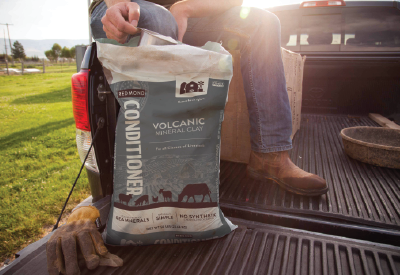What is Bentonite Clay?
Bentonite clay is harvested from ancient volcanic ash deposits that typically have landed in a marine environment. Over time, the ash weathers and ages to become bentonite clay. For thousands of years, humans have used bentonite clay to promote health internally and externally, as well as supporting healthy crops and livestock.

Just like living organisms, rocks and minerals are organized into groups based upon physical and chemical characteristics. Bentonite clay belongs to a mineral family called smectites.
- Smectites: a group of phyllosilicate minerals (specific configuration of silicon or sometimes aluminum, and oxygen molecules).
- Bentonite clay: a smectite clay named for the region where the mineral was originally found (near Benton Wyoming).
- Montmorillonite clay: a smectite clay named for the where the mineral was originally found (near Montmorillon, France). Same clay as bentonite, just named for its region of discovery.
The names bentonite, montmorillonite, and smectite are sometimes used interchangeably by manufacturers.
What Makes Smectite Clays Special?
Smectite clays are made of plate-like grains with a rather large surface area. This unique physical structure gives them some incredibly useful chemical characteristics.
Adsorption
Smectite clays are very adsorptive. Adsorption is a solid substance’s ability to hold gas or liquid molecules as a thin film on its surface. With a large surface area and a naturally negative charge, smectite particles can gather and store a large quantity of positively charged cations.
Absorption
Smectites like bentonite and montmorillonite are also very powerful absorbers. Absorption is a solid substance’s ability to completely soak up and retain gas or liquid molecules.
Toxin Binding
According to the National Institute of Health (NIH), these clays can also bind to harmful toxins more efficiently than even charcoal. By binding to both man-made and naturally occurring toxins, smectites can prevent living tissues from absorbing harmful substances.
• Learn more about toxin binding.
Clay for Animal and Soil Health
Clay particles store minerals in a way that makes them biologically available to living organisms. Through adsorption and absorption, they can attract essential minerals and electronically exchange them with living tissues. They can also bind to substances that would otherwise irritate and harm these same tissues. The NIH study mentioned above has found that bentonite clay can:
- Prevent and treat skin lesions, ulcers, and rashes
- Treat digestive upset
- Support gut microbe colonies
- Increase gut nutrient absorption
- Boost immune response
- Improve renal health and kidney function
- Regulate thyroid health
- Act as a natural antibiotic for some harmful bacteria strains
- Reduce the bioavailability of toxins
• Learn more about bentonite clay benefits for all species of livestock
Clay particles also produce a wide range of plant health benefits:
- Stabilizes soil (especially important for loose, sandy soils)
- Improves soil moisture
- Stores positively charged nutrients to exchange with plant roots
Redmond Clay Conditioner
The winning combination of volcanic ash deposit and marine environment created the Redmond clay and mineral deposit in central Utah. Redmond Conditioner is harvested from this incredibly unique resource, and has spent millions of years attracting over 60 trace minerals from the surrounding deposit. For over 50 years, farmers have enjoyed the many health and productivity benefits of our clay and mineral mixes.

Animal Supplement
Adding Redmond Conditioner to your livestock mineral program will naturally compliment everything you are already feeding your animals. Customers are happy to tell us they have noticed “their animals just do better on Redmond:
- Improved weights
- Healthier immune response
- Reduced mortality rates
- Healthier coats and hooves
- Greater stamina
- Increased feed efficiency
- Improves fiber digestion
- Maintains healthy gut ammonia levels
- Efficient rumen buffer (just as effective as sodium bicarbonate)
- Binds to toxins in feed and forage
- Reduced mineral costs, and more!
Soil Amendment
Redmond Conditioner can also introduce a wide range of benefits for your soil and vegetation health. Click to see soil application rates.
- Increase soil CEC (clay particles store nutrients on their surface and exchange with plant roots)
- Improves soil fertility
- Enriches soil and plants with a profile of over 60 trace minerals
- Increases plant yield and nutrient density
- Mineral salts that increase EC (electrical conductivity)
- Stimulates soil microbe colonies
No matter the size of your operation, Redmond can help you improve the health and productivity of your farm. Give us a call today at  .
.
© 2024 Redmond Minerals Inc.

